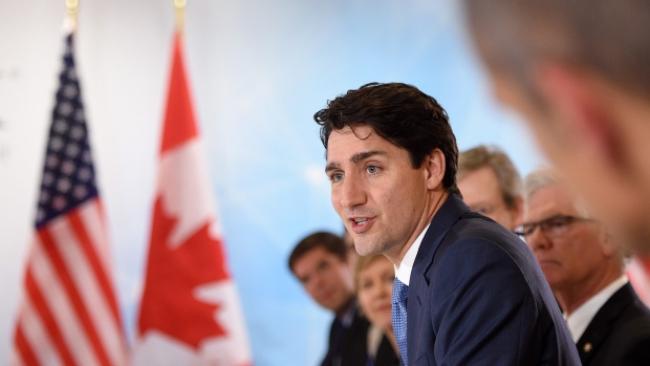Articles Menu

[ Editor: Oh really!! Trudeau: 'No country would find 173 billion barrels of oil in the ground and leave them there' ]
For the first two-and-half days of the CERAweek energy conference in Houston, Canada didn't make many waves. If you played a drinking game and took a shot every time Canada was mentioned on the main ballroom stage, you'd have been still sober midway through the week.
But beginning with Natural Resources Minister Jim Carr late Wednesday afternoon, Canada's full-court press began. After speaking at a Canada-focused breakfast earlier in the week and meeting with more than a dozen regional executives and politicians, Carr took the main stage and talked up the Canadian vision of energy development to a decent-sized crowd.
Carr mentioned job creation and pipeline approval, pricing carbon and respecting First Nations communities.
Then the big gun came to town. Prime Minister Trudeau spoke to packed room of around 1,200 energy executives and other leaders on Thursday night and completely charmed them. They clapped when he spoke in French, when he mentioned pipeline approvals, even when he talked about putting a price on carbon – albeit less loudly on that last point.
Trudeau got multiple standing ovations. From an oil patch crowd. In Texas.
The moderator, oil patch scholar Daniel Yergin, declared the whole crowd of 60 nationalities to be symbolical Canadians for the night at the conclusion of a question-and-answer session Trudeau participated in following his speech.

Trudeau: 'No country would find 173 billion barrels of oil in the ground and leave them there'0:30
Whether Trudeau's charisma and his vision for Canada's energy future translates to more investment in our energy sector is an open question.
Earlier on Thursday, we learned that another international oil company, Royal Dutch Shell has sold off the bulk of its oilsands assets for more than $8 billion US. It remains in Canada, but with a smaller footprint.
Shell has a very similar vision as Canada for energy development. It believes in pricing carbon and was part of the coalition that came up with the carbon levy in Alberta. But the company's chief executive, Ben van Buerden, said that it has been working on a deal for more than a year, dating back to when oil prices were trading around $30 a barrel. At that price the oilsands are not profitable and Shell clearly had other places in which it wanted to invest.

Natural Resources Minister James Carr answers, seen Thursday, took multiple opportunities this week to promote Canadian interests, and come out against border-adjustment taxes. (Sean Kilpatrick/The Canadian Press)
Judging from the market reaction, the buyer of Shell's assets, Canadian Natural Resources, got a good deal.
CNRL knows the oilsands and it has the scale to produce bitumen at a lower price. It was a dollars and cents decision. Warm and fuzzy feelings for Canada had little to do with it.
Trudeau's other goal was to remind the Americans in the audience that Canada is a key trade partner of Texas in particular and the U.S. in general. Texan exports to Canada were worth nearly $20 billion annually, imports from Canada about $15 billion.
Trudeau pointed out that amounts to 460,000 jobs. Good Texan jobs, as he put it.

Canada is worried about a border-adjustment tax, which could levy a fee on Canadian products and resources crossing the border. The possible tax was talked about cautiously by many energy companies over the course of the conference.
Canada is opposed, naturally, and Trudeau took aim at it in the Q&A session, using the example of auto parts moving across the border multiple times before ending up in a vehicle and the logistical nightmare that would be involved in charging a tax each time a part crossed the border one way or the other.
In a news conference earlier on Thursday, Carr spoke about his meetings in Houston. In response to question about the border tax, he outlined the strategy that Canada has taken.
"We're not always top of mind, but when we have an opportunity to explain Canada's position, we always have to do it in the joint interest and not only in Canada's national interest."
CERAWeek is a conference that brings together many of the most powerful people in the global energy sector, an industry that is very influential in the United States right now. Canada had the opportunity to be top of mind for a day in Houston and Trudeau made the most of it.

WATCH: Justin Trudeau's full speech in Houston12:47
[Top photo: Prime Minister Justin Trudeau takes part in a roundtable discussion on the future of energy with industry leaders at CERAweek in Houston on Thursday. (Sean Kilpatrick/The Canadian Press)]